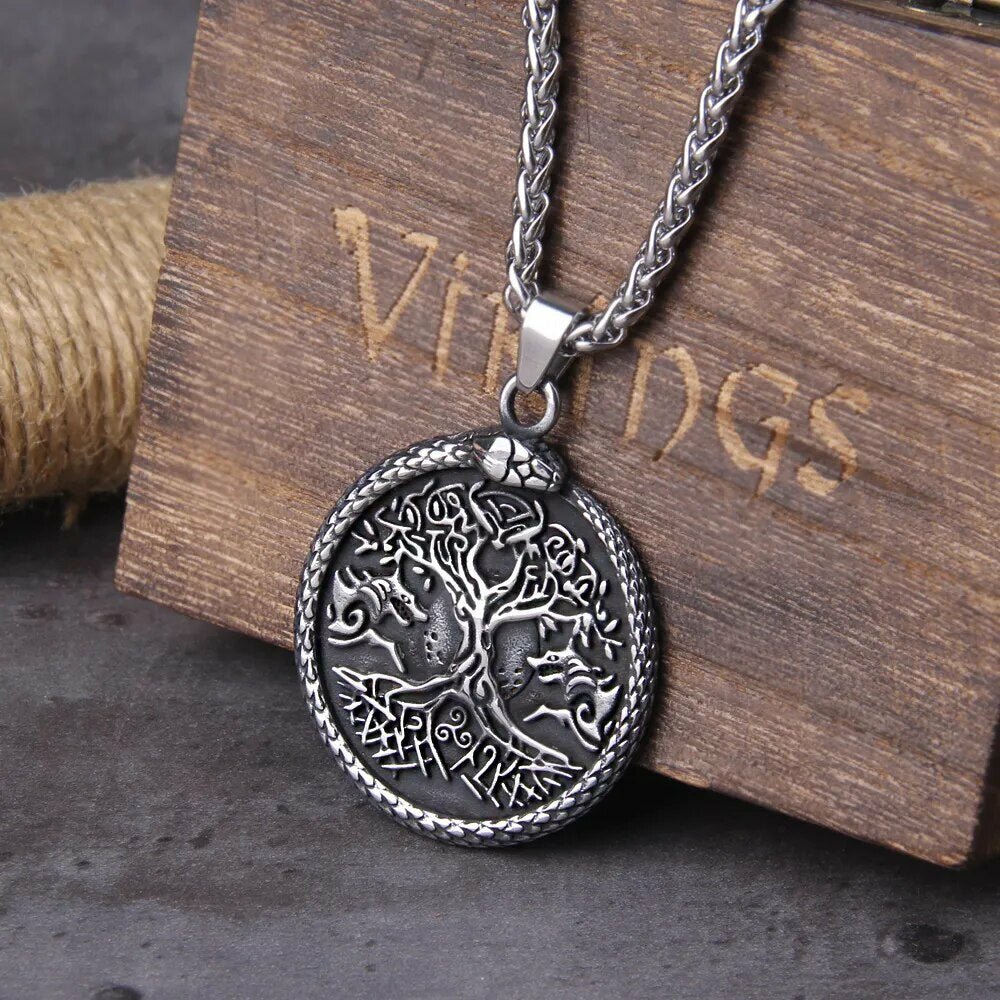
The Norse Arm Ring and Its Significance
Share
Forged by the legendary dwarven smiths renowned for crafting Mjölnir and the majestic boar Gullinbursti, Odin was bestowed with an extraordinary ring named "Draupnir," made entirely of solid gold.
This remarkable ring possessed the magical ability to replicate itself eightfold every ninth night, potentially serving as the inspiration behind the revered Viking Arm Ring, which held significant cultural and spiritual importance in Norse society.
The Vikings, known for their deep-rooted emphasis on honor, structured much of their societal framework around maintaining personal and collective honor, with severe consequences for oath-breakers. Even achieving entry into Valhalla, the warrior's afterlife, demanded a death marked by honorable combat.
In addition to their valor in battle, Vikings were also skilled navigators and traders, establishing extensive trade routes across Europe and beyond, further solidifying their influence in medieval commerce.

Understanding Deity
Undoubtedly, one of the most solemn ways to pledge an oath among the Norse was to swear upon the Aesir, the gods of their pantheon.
According to the Landnámabók, an ancient Icelandic legal manuscript, there are documented instances where individuals swore oaths on rings dedicated to prominent deities such as Njörðr and Freyr, as well as a mysterious figure known as "Almighty God," likely referring to Odin, the foremost deity in Norse mythology.
This practice of oath-swearing upon sacred rings not only reinforced the solemnity of the commitment but also underscored the deep spiritual connection the Vikings held with their gods.
These oath-bound rings were believed to imbue the swearer with the protection and favor of the gods, ensuring their loyalty and adherence to their promises in both personal and legal matters throughout their lives.

Viking Weapons
Weapons held a profound symbolic significance in Viking culture, not only as tools of warfare but also as embodiments of honor and oaths.
Historical records indicate that Vikings frequently swore solemn oaths upon their weapons, a practice deeply rooted in their belief that failing to uphold such pledges would jeopardize their chances of entering Valhalla, the warriors' paradise. This oath-taking ritual was not just a formality but a binding contract infused with spiritual and cultural significance.
By swearing upon their weapons, Vikings committed themselves to the highest standards of honor and loyalty, understanding that any breach of trust would not only tarnish their reputation but also potentially forfeit their eternal reward in the afterlife.

Norse Arm Ring
The Norse arm ring held a pivotal role within their culture, far beyond mere displays of wealth and status that other forms of jewelry typically conveyed. While jewelry in Norse society certainly underscored prosperity and social position, the arm ring transcended these aspects, embodying a deeper significance as a symbol of oath-making and communal bonds. This iconic piece of jewelry linked individuals not only to their gods and ancestors but also to their fellow Norsemen in a profound and enduring manner.
In the solemn act of oath-swearing, the arm ring took on a sacred role, symbolizing a binding commitment akin to swearing upon revered deities or sacred weapons. Its circular form, often intricately adorned with runes or intricate designs, represented the continuity of these pledges and the unbreakable nature of promises made. To wear an arm ring was to publicly affirm one's personal honor and integrity, while also pledging allegiance to the community and a steadfast dedication to one's sworn obligations.
Beyond its symbolic weight, the arm ring also functioned practically as a form of portable wealth. Crafted from precious metals such as silver or gold, it could be easily traded or even broken apart and weighed for transactions or tributes. However, its true value lay in its ceremonial and spiritual significance, serving as a tangible link between the wearer and the supernatural forces and social bonds that defined Norse identity.
In Norse sagas and historical accounts, arm rings often feature prominently as tokens of alliances forged, promises sealed, and heroic deeds celebrated. They symbolized not just personal adornment but a visible testament to one's place within the intricate web of Norse society, where honor, loyalty, and kinship were paramount. Thus, each arm ring was not merely a piece of jewelry but a profound statement of identity and allegiance, embodying the rich cultural tapestry of the Norse people.

Viking Influence in Modern Times
Though the practice of swearing oaths on arm rings is rare today, the symbol remains relevant in modern contexts. In contemporary society, an arm ring can represent a personal pledge to uphold values such as integrity, loyalty, and honor.
While we may not be pledging oaths to monarchs or deities as the Vikings did, wearing an arm ring can serve as a daily reminder of our commitments—to ourselves, to loved ones, and to the principles we hold dear. It symbolizes a bond of trust and fidelity, urging us to maintain the same level of dedication and integrity in our everyday promises and actions.
By embracing the symbolism of the arm ring in a modern context, individuals can draw inspiration from the ancient Norse tradition to uphold their moral standards and honor their commitments with sincerity and steadfastness.
Conclusion
The Norse arm ring stands as more than just a piece of jewelry; it embodies centuries of cultural significance and spiritual devotion among the Viking people. From its origins steeped in mythical craftsmanship to its role in solemn oath-taking rituals, the arm ring symbolizes a commitment to honor and integrity that transcends time.
For the Vikings, the arm ring was not merely an accessory but a tangible manifestation of their deepest values and beliefs. Whether sworn upon in the name of gods like Odin or used as a symbol of communal bonds, these rings carried immense spiritual weight. They represented a pledge to uphold personal honor and loyalty, echoing the profound ethos of Viking society where oaths were sacred and binding.
In today's world, while the practice of oath-swearing on arm rings may have faded, its symbolism remains powerful and relevant. It serves as a reminder to uphold our promises, maintain our integrity, and honor our commitments with the same sincerity and dedication as our Norse ancestors did centuries ago. Just as the Vikings valued their arm rings as symbols of trust and fidelity, so too can wearing such jewelry prompt us to strive for excellence in our everyday actions.
To explore the timeless allure of Viking jewelry and discover pieces that resonate with history and strength, visit Triple Viking. We are more than just an online jewelry store; we are custodians of a rich legacy. Embrace the spirit of the Viking era with our exquisite Viking Necklaces, Viking Bracelets, Viking Earrings, and Viking Rings, each crafted to reflect the enduring virtues of honor and resilience. Let Triple Viking be your guide to connecting with the mystique and majesty of ancient Norse culture.

